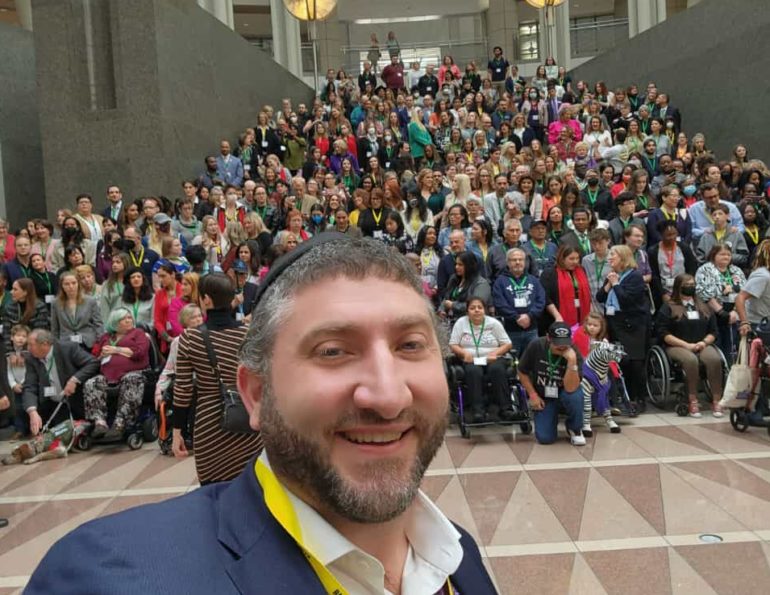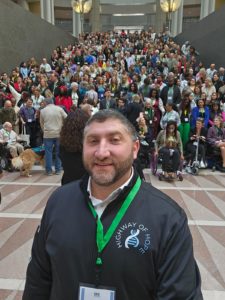
How One Orthodox Man with a Rare Disease Helps Tens of Thousands with Their Own
When was the last time you thought about a rare disease? If you’re lucky, it’s never. If you’ve been impacted in some way — whether you have one or someone close to you does — you know how debilitating and painful it can be.
That’s what Yehuda Gelman is trying to change — and already has in major ways.
He was born with Dandy Walker Malformation which is a congenital condition, meaning it happens before birth, where the cerebellum does not develop normally. The cerebellum is the area of the brain that controls movement and balance. As a result, he developed Hydrocephalus which is a neurological disorder where you have an excess of fluid build-up in the head.
To treat hydrocephalus, you need a ventriculoperitoneal shunt, or a VP shunt, as it’s referred to which drains that excess fluid. While it may sound promising that there’s a way to manage it, and it is, it’s not an easy or low maintenance one. Gelman had the shunt put in at 24 hours old and at 40 years old now, he’s had 35 brain surgeries to repair or replace the shunt. A colleague he worked with who is the same age and also had the condition is up to her 137th surgery.
Gelman says he never shied away from his diagnosis, even with the stigma that unfortunately can exist in the Orthodox world about medical conditions. His goal is to try and change that. He has spent his life pursuing answers, and wanting to give back to the medical community.
At age 12, he did his science fair project on the VP shunt. When he was in Israel after high school, he became an EMT and then became recertified back in the U.S. He wasn’t great in school — his condition can cause learning issues — so he decided being a doctor would be too much of that and pursued nursing instead.
He thrived in the clinical aspect of the nursing program, but struggled in class. Ultimately, due to difficulties with test taking during his last semester and the school struggling to accommodate his disability, he wasn’t allowed to graduate.
Gelman was devastated. He had worked years to get to this point. Later, however, it all seemed to be a part of Hashem’s plan. He decided to research if there was any kind of support he could find legally to get the school to let him finish the program, and retake the final he needed. He was on page three of Google when he discovered the Hydrocephalus Association.
He was shocked. Growing up with this disorder his whole life, he never knew the organization existed — and it did his entire life. He was so floored he got in his car and drove to its headquarters in Bethesda, Maryland from Lakewood. He walked into the office and said, “I’ve never heard of you, so you’re doing something wrong. How can I help other patients find out about you?”
Gelman almost immediately started working for them as a volunteer. Three months later, he was hired as an employee.
As a part of the job, he went to Rare Disease Week in Washington D.C. which is usually held the last week in February. The idea is to culminate on February 29 (when the date exists) as it’s known as Rare Disease Day being that it’s the rarest date on the calendar. (When there is no February 29, they’ll honor it a day ahead).
During Rare Disease Week, organizations come to Congress to thank them for funding rare diseases and continue to educate them on why it’s so needed.
During this week — the first year he attended — he ended one of the nights with a dinner at a kosher restaurant in D.C. with some colleagues. After the dinner, he was driving back to his hotel in Silver Spring, M.D. which was only supposed to be about 15 minutes and take him through a park.
Unfortunately, the park was closed so the GPS needed to redirect him, not such a big deal normally. But when he got on the highway, his GPS shut off all of a sudden and couldn’t connect. His music stopped. His phone stopped working. He didn’t know what to do. He looked around and didn’t see anyone for a while. He truly thought he was going to be lost. Then, a few minutes later, everything started working again. He saw cars driving home. He made it back to his hotel.
It turns out, where he was driving is also the CIA headquarters and once a week for a 15-minute period, they shut off all satellites so they can test their security. That experience — which was terrifying for him at the time — became the mashal, or metaphor for his life as someone living with a rare disease, and led to him starting his own organization called Highway to Hope.
“That’s the journey of a patient with a rare disease,” he explains. “A mom and dad have a normal pregnancy and then there’s a slight hiccup. They continue with life and the child is a little delayed on their milestones but they move forward. Then when they get the diagnosis, all signals stop working. They look around and wonder if anyone is on this road with them. They feel alone. Then, you start to see others ahead of you and behind you and you start to get help.”
The goal of Highway of Hope is to connect those going through the challenges of a rare disease or having a child with one with anything they may need physically and emotionally. While other organizations exist to lobby for funding or to be a support system for other organizations like NORD, the National Organization for Rare Diseases, Highway of Hope is there to help the individual.
Gelman didn’t feel like he had that growing up. He searched high and low and didn’t find the organization for his particular disease until much later. Now, Highway of Hope is there for others to help ease the pain, burden, struggle and confusion of dealing with a disease not that many may know about.
They help patients find the right doctor for them, work to organize food packages, look to find clinical trials that may be beneficial and offer emotional support. While Gelman’s work started within the Orthodox community, he has expanded widely since and now most of the people he helps are not Orthodox or even Jewish. He found those communities needed it more. While the Orthodox community is no stranger to a meal train and bikur cholim — visiting the sick — outside communities are not as familiar. That chesed, or active kindness, is not a given. Highway of Hope is that for so many. As of this week, the organization hit 75,000 patients serviced.
When getting diagnosed with a rare disease, or having a child diagnosed with one, it can feel devastating, confusing, scary. The next step often? Turn to Google to learn more. Gelman explains that is one of the worst things you can do. He met a father of a son who has a disorder called Nieman Pick Type C and the father said he still has sleepless nights because of what he learned on Google, not even from how the disorder manifested in his own son.
Highway of Hope is extremely sensitive to that and the information patients and their family members receive. They will actively join Facebook groups and either moderate or just get a feel for the group before allowing the patient and family members to join to make sure it won’t become a traumatizing place.
“Why let the pain of what tomorrow could bring affect you today?” Gelman asks. “That’s what we’re tirelessly trying to change.”
Gelman himself is living proof of beating the odds. 90% of people with Dandy Walker Malformation who don’t have hydrocephalus are severely special needs. Of the patients with DWM who do have hydrocephalus, about 40% have severe special needs. Of that 60% who don’t, many have learning challenges. Gelman says he only struggled with a slight learning disability. He also has Cerebral Palsy where the vast majority of patients are in wheelchairs or have a speech impediment. When Gelman is walking or speaking, you can barely tell he has it, if at all.
“It allows me a seat at the table,” he shares. “Unfortunately, there is still a stigma around these conditions…While they do have the potential to be exceptionally debilitating, I want to show people that there’s a reason to live.”

If you found this content meaningful and want to help further our mission through our Keter, Makom, and Tikun branches, please consider becoming a Change Maker today.







